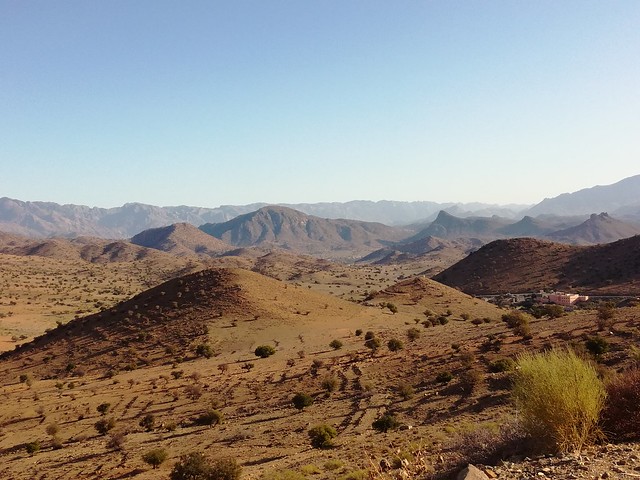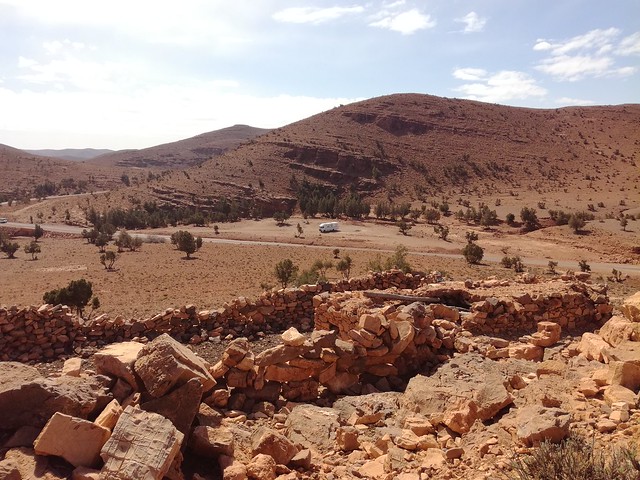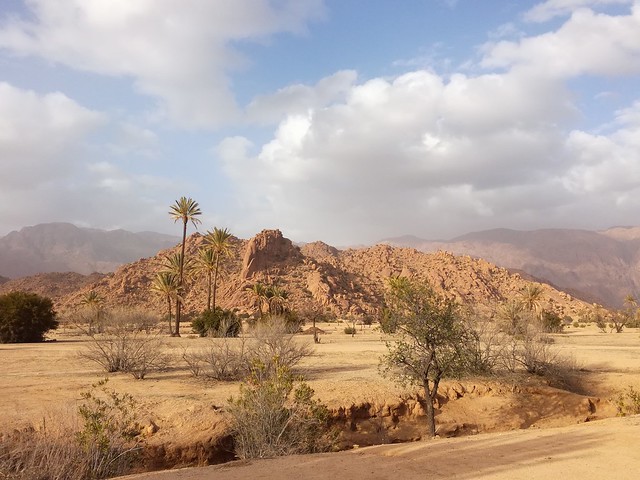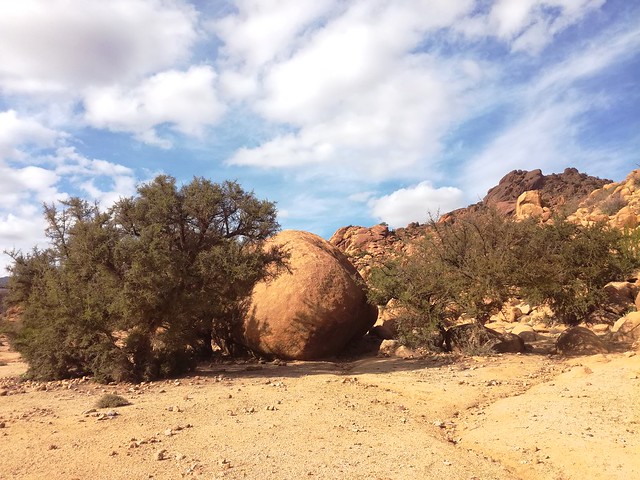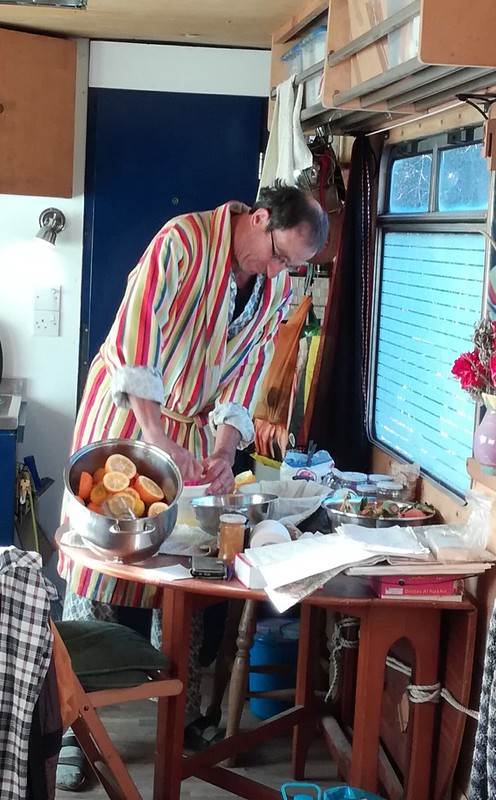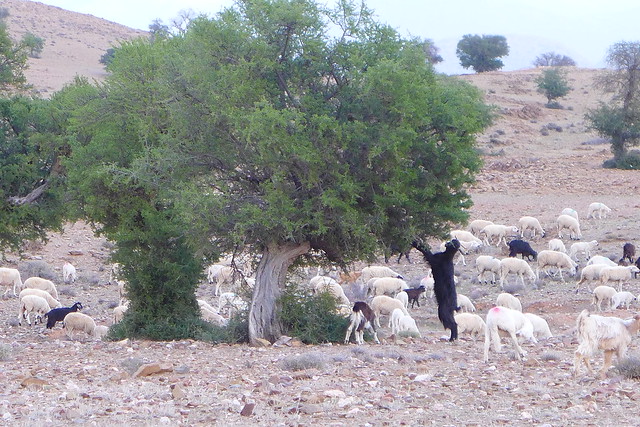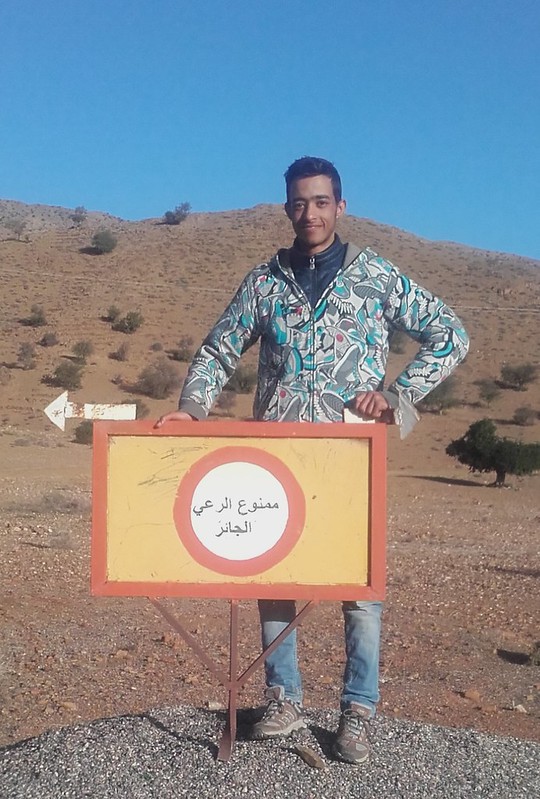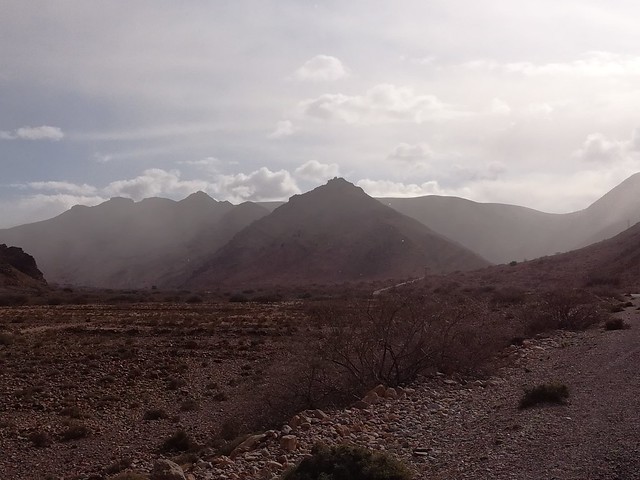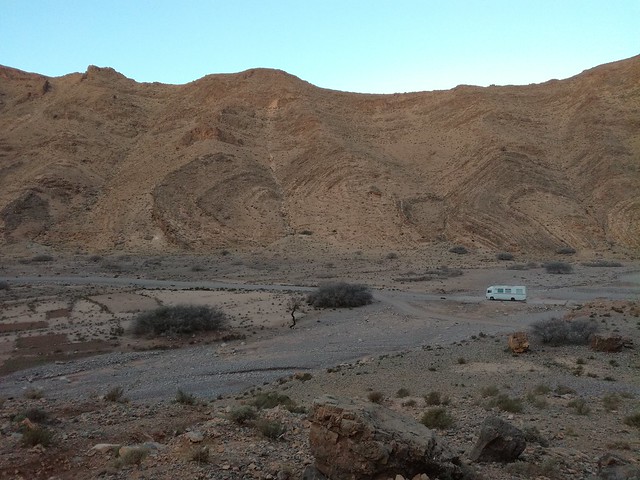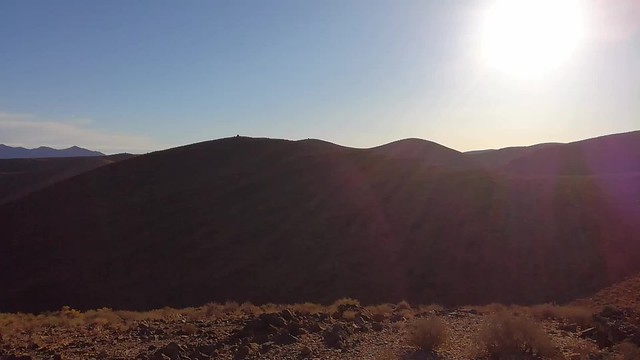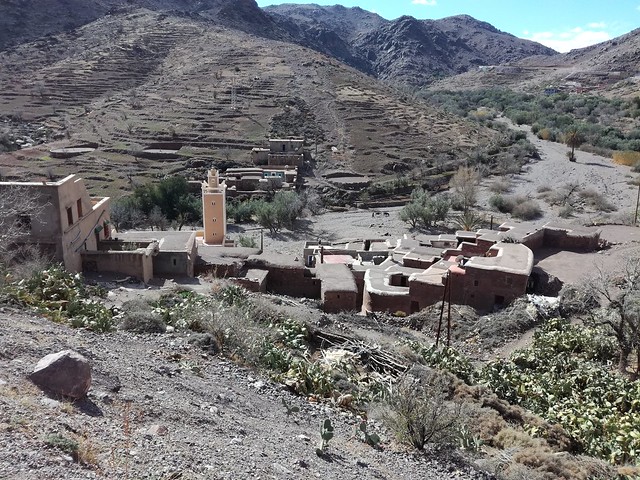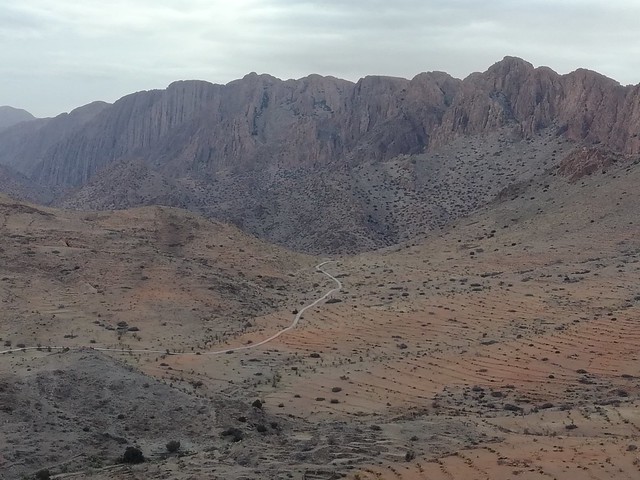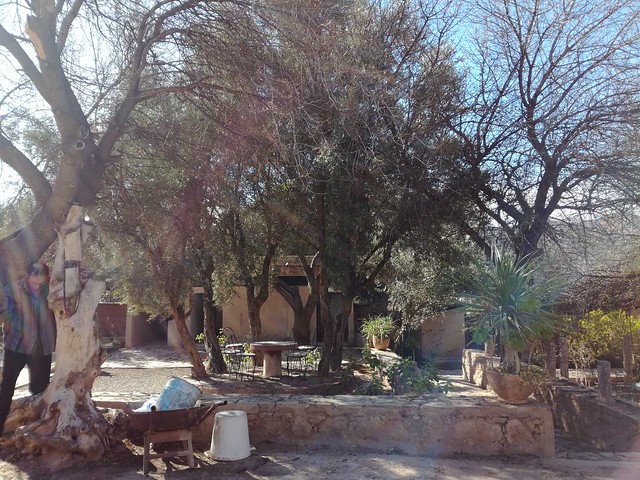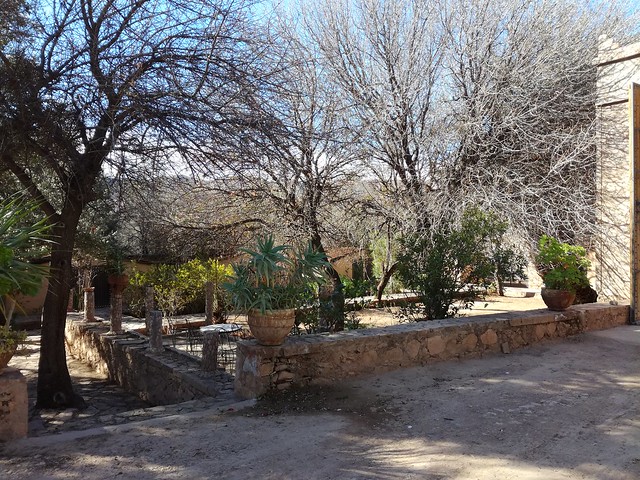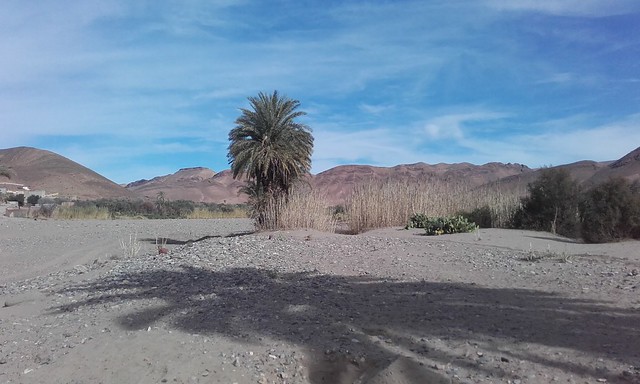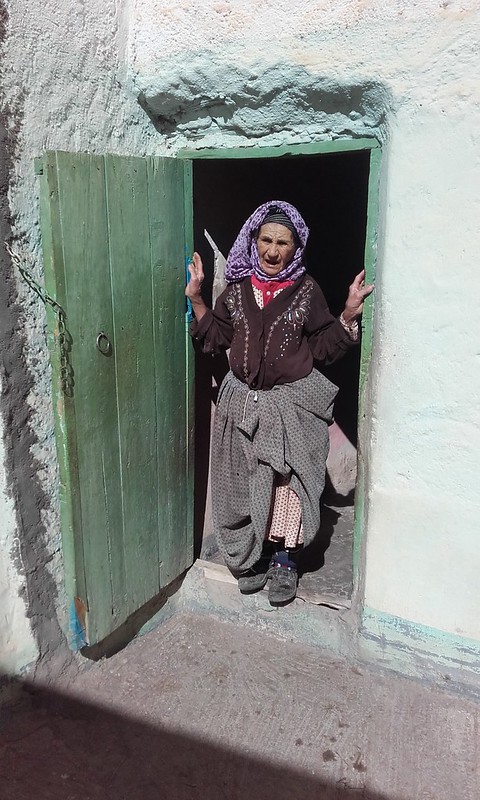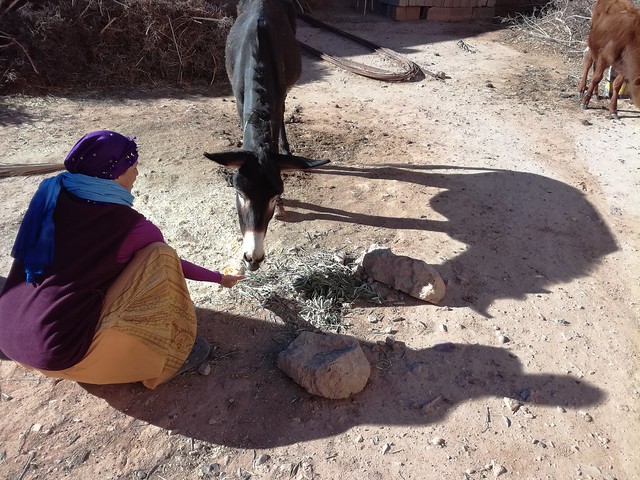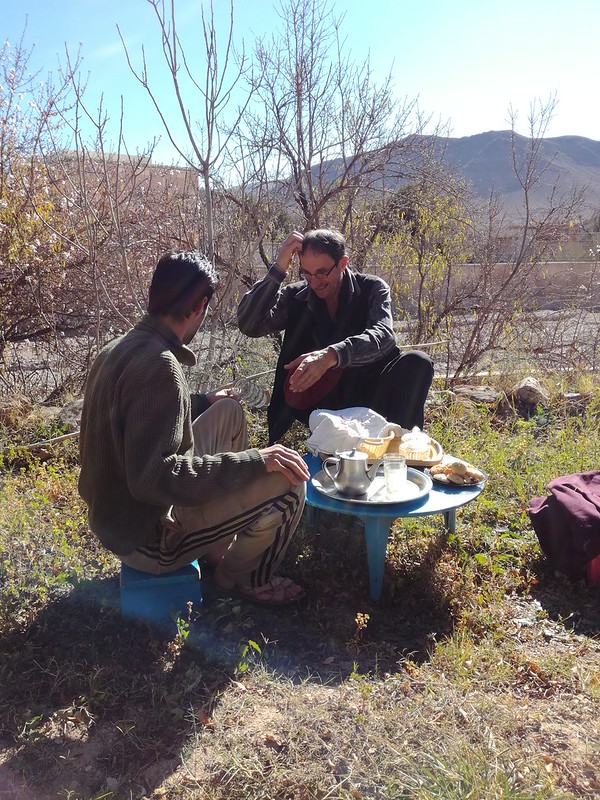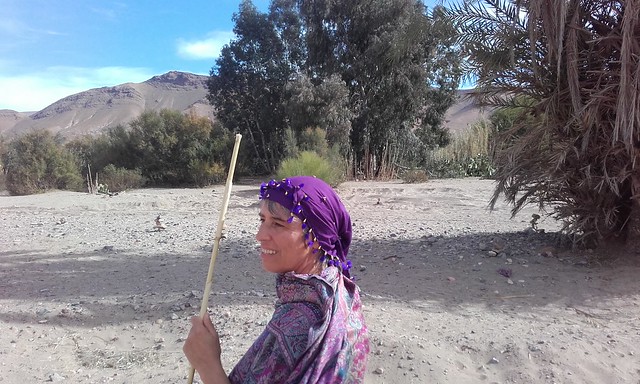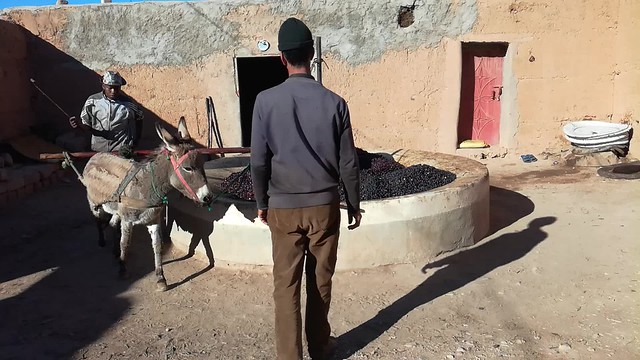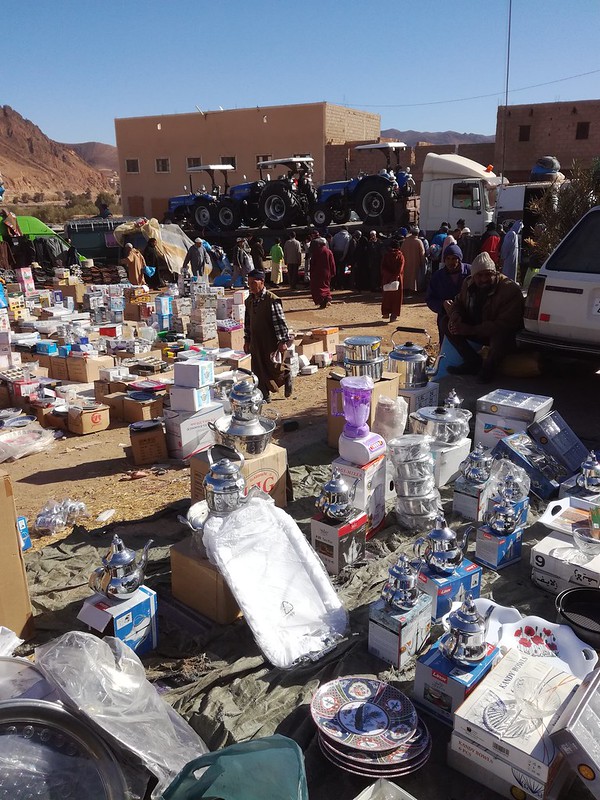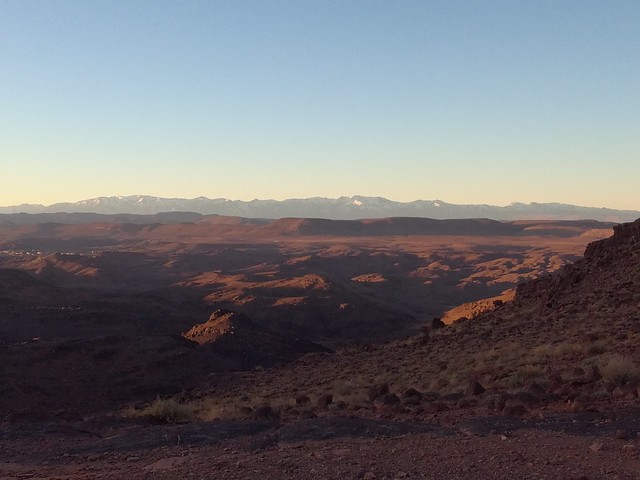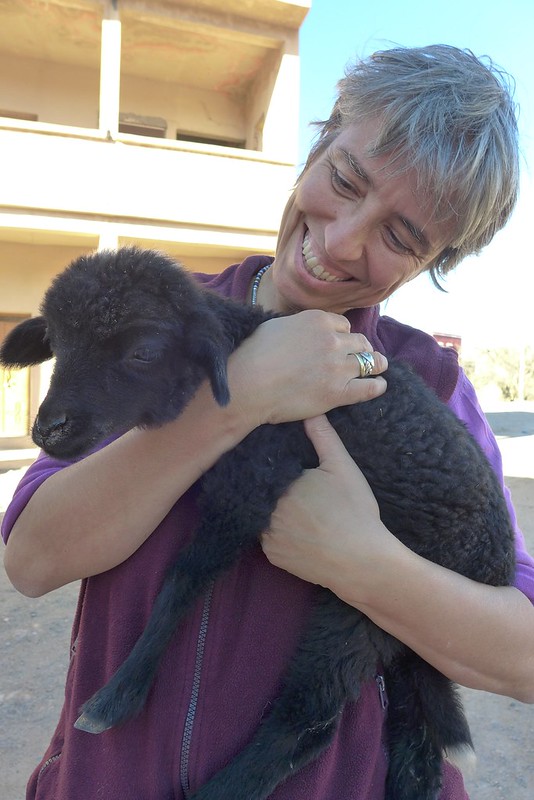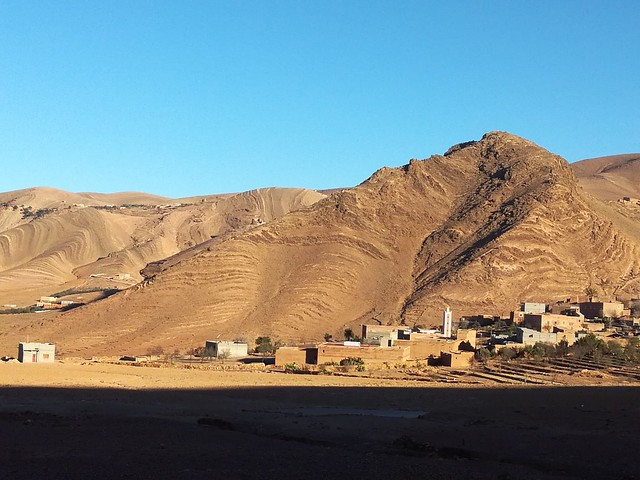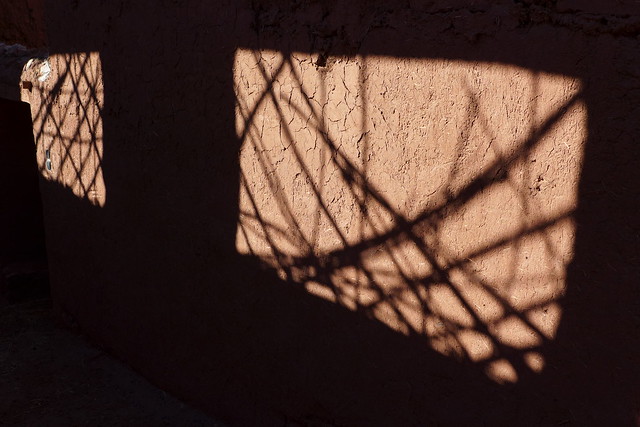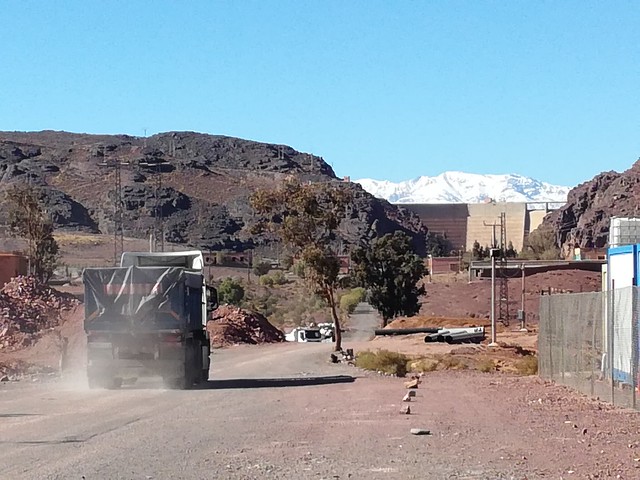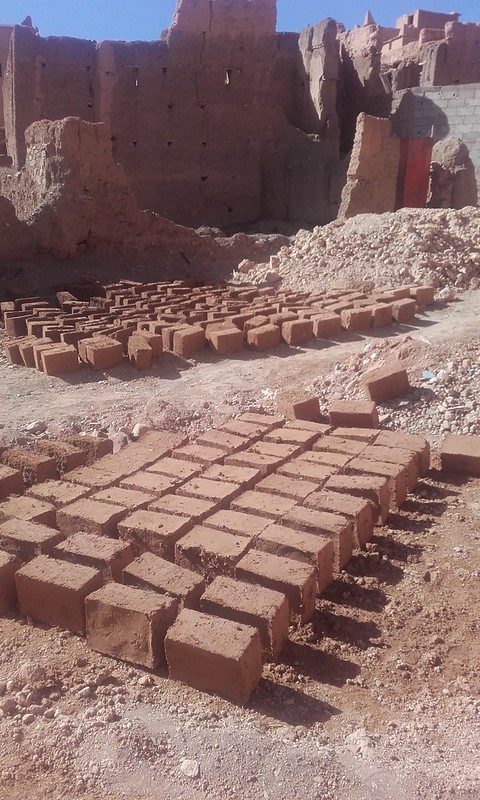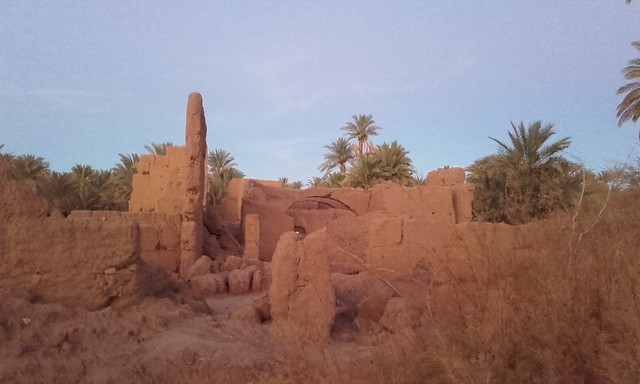To Abaynou
Sala comes with us until we need to turn off Southwards. We drop him in a vibrant, little village where we stock up with food, knowing that we are about to take another stretch of road less travelled.
Over the next few kilometers, the landscape slowly flattens out and returns from rugged mountaintops towering over layers of fertile terraces, to more undulating, light-brown arid hills.
We stop for lunch in a quiet, isolated valley amongst a plantation of young pine trees. Instead of a siesta, I decide to climb up the hill in the midday sun. It is very quiet here, but there is a light sussurating sound… like a car approaching. It takes me a while to realise it’s the wind going through the surrounding pine trees – a sound I haven’t heard in a while.
Finally, the road completely flattens out and we’re back in desert landscape. A battered old road sign promises a hot swimming pool with 39 degrees heat and I wonder if it is some kind of hot spring, so we turn off and bumble 16km across rough tracks to arrive in Abaynou.
There is indeed a hot spring here that feeds two gender-separate swimming pools. We are lucky though, as Thursday night is mixed night in the women’s pool. Rachid, a friendly young local points us to a place by the side of the village where we can park up for free. Once again, we have a conversation warning a young man off the idea of going to Europe. We also leave him with an idea for a hot composting business; something I would certainly do if I were to move here.
There is a proper camp-site further up the valley, which I come across on a cycle ride the next day, founded by a Swedish woman called Britta Elisabeth Dancy. It is one example that shows how one can make lush gardens in this inhospitable environment. There are many trees and some birds I haven’t seen before. However, I’m not tempted to stay at this site – it looks too exclusively plastic-fantastic, mostly french, and the manager seems to be quite gruff. I’m glad I came on a recce by bike instead of shlepping Emma across 2km of rough piste.
We take a walk through the Oasis of Abaynou. A flash flood wreaked a lot of havoc six years ago, sweeping across the oasis and destroying many houses. Only half-hearted attempts have been made at rebuilding since then… we find a sadly neglected Palmeraie and there is a lot of debris in the river – in stark contrast to the many unusual metal signs we see about a local initiative called ‘the society for renewable energy Abaynou’. When we ask Rachid about this later, he has never heard of it, despite spending much of his working day standing right by one of these signs, as he directs cars to the various car parks available around the swimming pools.
The hot spring experience is a lot more prosaic than I expected it. At the entrance, you get a washing basket to put your clothes in and then you descend to the swimming pools past the showers (defunct) and the toilets (working, but no light). The water smells as if it’s rich in iron and it is comfortably warm but not really hot. It’s ok, but not riveting.
*********
For some more photos, click here
Posted in Uncategorizedwith comments disabled.
Tafraoute
The weather suddenly changes – a strong wind picks up and there is a silvery grey atmosphere that makes even nearby mountains look hazy. We don’t really know what this is – it doesn’t look like rain. It is cold enough for snow to fall, or maybe this is a kind of sandstorm? The change of weather has knocked us out a bit. Frank is in bed once more, nursing a cold and I use the time to catch up with our blog and admin.
It would be great for nature if there were some proper rain. The oasis of Tafraoute looks well parched, although some farmers are hopeful and have ploughed their fields in readiness for water.
One day I take a walk through the oasis. The rock formations are different to anything we’ve seen in Morocco so far. Huge boulders lie around in between Argan trees, as if the gods have been playing marbles.
The shops in town sell Argan products at hefty prices. What has really taken our fancy though is Amlou, the most delicious almond paste I’ve ever come across. We buy a big pot and eat it on fresh flat-bread, with a smattering of Frank’s Lemon and Bergamot marmalade on top – yummy!
Here’s a photo of Frank on an early-morning stint of ‘marmalading’.
Near our campsite, there is a large open part of the Oasis where many campers have parked up. It’s quasi wild-camping, with a man from the commune passing by every day, charging 15 Dh, but for once I’m not keen to join the wild campers and I can’t put my finger on why that is so. The front of the campsite is dominated by French campers, of the ‘plastic-fantastic’ variety, while the hippies have spread out several hundred metres into the Oasis. There would be plenty of space to park up in between and not be bothered by anyone, but somehow this place gives me the creeps. As soon as Frank is well enough, we get out of here.
(Later, we find out that there’d just been a huge techno rave with abundant use of drugs. Maybe that contributed to my feeling of discomfort)
About 20km from Tafraoute, we pick up young Sala who is hitchhiking back home to Agadir. At age 22 and an economics student in his final year, Sala says he’s a bit confused about what he wants to do with his life. His English is surprisingly perfect, considering he learnt it mostly from films. As with so many young men, his view is towards Europe, but he listens attentively to our warnings that Europe will not give him the reception he dreams of and for once, our encouragement to find his vocation here in Morocco seems to fall on fertile ground.
As we drive along chatting, the landscape suddenly opens up and we decide to stop for the night – tonight’s moonrise is special, it being a super, blue-blood moon and we appear to have found a perfect place to see it from.
As the light fades and we light a fire in Emma, a shepherd passes by with a very well nourished heard of sheep and goats. Some of the goats obligingly stand on their hind legs for Frank to take the photo of ‘goats in Argan trees’ that he’s been looking out for, ever since we came into the area and found a crumpled postcard depicting such a scene.
The shepherd has a lovely, bright-eyed smile, but communicating with him is difficult – he only speaks Berber, which we don’t. Nevertheless, we somehow show him our appreciation of the good-looking animals, and he nods proudly. This is a young man who seems very happy with his lot in a rural, isolated landscape, looking after his herd all day. He doesn’t seem in any hurry to abandon his life here and find another one in Europe!
The moon indeed makes a spectacularly bright appearance, though sadly we are not in the right part of the world to witness the eclipse. We get the first inkling by an otherworldly hue on the underside of clouds, and then the moon climbs over the mountainside, spilling its milky-white light across the landscape.
We invite Sala to stay for dinner but he wants to hitch another lift, having run out of money and needing to get back to Agadir. However, the sun has already set and after a little while Sala reappears at our door, glad to accept the dinner invitation, having found a little cave under an Argan tree where he has spread out his rolymat and sleeping bag for the night.
We share a lovely evening exchanging stories. Sala is inspired by our campervan life. When he leaves, we give him one of our hot water bottles for the night and arrange to continue our journey together after a good night’s sleep. The next morning we share our last bits of bread and leben with Sala and drive on with the sun on Emma’s back.
That’s Young Sala, holding a sign which says ‘no excessive grazing’. We found it lying down, probably trampled by sheep…
*************************
For more photos of this chapter, click here
Posted in Uncategorizedwith comments disabled.
Taliouine to Tafraoute
It’s been rather cold recently, so we are keen to go further South. There’s a minor road on our map that leads to Tafraoute from Taliouine, right across the Anti-Atlas and we feel ready for more adventures off the beaten track. For two days, we enter another stretch of breathtaking, jaw-dropping landscape, as Emma slowly winds herself up into the mountains.
We stay overnight on a disused bridge (one part of it having been washed away and the road having been re-routed), in a very silent valley.
Next morning, I go for a strenuous scramble up the mountainside to be rewarded with a 360-degree view for many miles, the snow-covered peaks of the High Atlas mountains visible in the north and a dusting of snow on the Anti-atlas too.
In Igherm, we catch sight of some freshly-baked Brioches in a café window. While enjoying them, we chat to the waiter, who lives here but has his sights trained on Europe. (As with all the young men we meet, we try to dissuade him and tell him that right now, Europe will not give him the welcome he expects). He comes to look at our van, and once inside and sure that the door is closed, for the first time in Morocco, we hear a voice critical of the King, whose decisions, he says, are sometimes driven by personal or financial interests and not for the benefit of his people.
After Igherm, the land seems to become more arable, with many little villages and intensively maintained terraces high into the mountains. It looks like I imagine a Chinese landscape to look like, with very steep mountain peaks towering over layers and layers of green terraces.
We see people dressed in very colourful clothing, often on an underlay of black. There are embroidered shawls and wraps with bright tassels and extraordinary headgear. We stop at a souq somewhere high up in the mountains and go out in our jellabahs, much to the delight of the local population. They lean over backwards, laughing at us. I wish we could take more photos to show you how they look like though, but here as everywhere, there is a strong reticence to be photographed, so we refrain. You’d never get an English person laughing at someone in this way, yet, it is such an innocent laughter that I would trade it any day for the thoughts that a northern European person might hold in private.
At the top of the mountains, we enter another plateau. Fields of Almond trees at I don’t know what height, maybe 2000m, before the view opens to the next mountainous valley and our road zigzags down amidst the most spectacular rock-faces. We have arrived in Tafraoute.
**********************
There are many more amazing photos of this chapter here
Posted in Uncategorizedwith comments disabled.
Lezagmouzen Camping
If we hadn’t smashed our window, we would never have come across this wonderful little paradise of a campsite! We receive a warm and relaxed welcome from Ali, the manager, who promises to help us find someone to repair the window. The next day, he brings a young and taciturn man who has a good look and goes way again, only to return some hours later with a piece of metal which he proceeds to insert into the space where once there had been a window. It’s not an easy job and at times we feel like he’s taken the wrong measurements, but he persists and eventually it slots into place. We are impressed by his tenacity and workmanship, except for the way he drips silver paint onto Emma.
It takes him the best part of the day to repair the window and he only charges us a 100 Dh – we give him 140. Now Emma has a little silver blind window – it’s like she’s had her first dental filling!
Ali shows us around the campsite. There are some Berber tent-style huts for simple accommodation. The shower has a wood-fired boiler (and is fantastic!), there is an enclosure for animals (but it’s empty except for a couple of little dogs), and there are a number of incredible trees, some of which are of a local species that is now rare. We meet Ahmed, the owner of the campsite, a few days later and he says they are called Atlas Pistachios. They don’t bear fruit but the resin gets burned for special ceremonies.
Ali tells us that Ahmed is thinking of selling the campsite, as well as a nearby, walled plot. He shows us both and for the first time in our 4 years of travelling we are seriously tempted. This seems a very special piece of land in a lovely village and we consider what it would be like to run this place, while also maintaining our lives in the UK. Looking at the campsite, our imagination runs wild. It will need quite a lot of TLC, having been just ticking over for a number of years, since the death of Ahmed’s son who was a great tour guide and involved in maintaining the site.
But this lack of attention is probably what attracts us, there’s lots to do to make this place sing again. Plus, in combination with the other piece of land, there really is room for expansion. For a whole 48 hours, we mull over the possibility of buying it. We dream about chickens and gardening, about going to the local souq on a donkey, and then we wake up one morning clearly knowing that now is not the time to do this. We are too deeply involved with life in the UK in general and with our children in particular. While we travel, we may be physically absent, but we have a lot of space and time to be in touch with them. If we were to take on a project like this, our headspace and energy would be fully taken up, and it’s just a bit too far away from the UK for anyone to just ‘pop over’ and visit.
We meet Ahmed once more to tell him of our decision and leave him with a suggestion that maybe we could come back next year and stay for a month, giving some of our time and energy to improve the place and maybe help him with a ‘rejuvenation’ project. Ahmed must have liked our ideas, because after offering it to us, he’s adamant that he will only sell his precious piece of land to someone he feels will appreciate the place and continue to respect what he’s built up. We like him too. He’s unusual and we share a few personal life stories before we bid him a heartfelt good-bye. Even though we don’t want to buy this particular one, thinking about it has clarified some ideas about the possibility of owning/running a campsite.
Ahmed’s place, an Auberge with rooms, is on the other side of the river from the campsite, so after visiting him, we decide to walk back across the dry river bed. We enter quite a magical place; a forest of silver-barked trees, maybe some kind of poplar, is followed by all sorts of bushes and plants we don’t recognize and there is a particular type of silence here. I can imagine this to be baking hot in the summer, with snakes languishing in the hot sand.
At the campsite, there’s a young man, Abdulatif, who helps looking after the campers. One day Ali and Abdulatif get it in their heads to cut back the trees, but they make a real hash of it. Ahmed is shocked when he comes to view the results. Abdulatif is a farmer, so it’s really surprising that he doesn’t know how to prune trees properly.
One morning, Abdulatif invites us to come for breakfast at his house. We meet his 80 year old mother, as well as some really ancient animals; a 37 year old cow and her calf, and a 40-year old donkey called Ariel.
The house is a huge Riad – Abdulatif and his mother appear to rattle around in its vastness. The very traditional kitchen with wood fired ovens for cooking and baking seems curiously at odds with a modern, two storey-high building, where an undercover courtyard gives on to many rooms on two floors. There’s a magical garden too, with all sorts of fruit trees – figs, almonds, lemons, olives and bergamots. The almonds are in full blossom and the garden is humming with bees. Abdulatif brings out delicious, freshly baked flat-bread and Amlou and of course ‘Berber whiskey’ – the strongly mint and absynth flavoured tea, sweetened with piles of sugar, and we sit under the trees in the morning sunshine, discussing life in Morocco and Abdulatif’s plans for the future.
One evening, we hear the tell-tale sounds of another Berber wedding in the village, but we are still chewing over the experience of our first, so we pass on this one. That night there is a light snowfall! The temperatures really see-saw from day to night here – it can be up to 25 degrees in the day and then snow at night! I wonder what that does to the almond blossom?
One day, Ali lets water into the campsite and for a few hours, we hear the happy gurgling of a stream rushing through the Azequias, gradually filling the flower- beds. That night, we hear the extraordinarily metallic sound of a toad, right next to our van.
Despite feeling so at home in this camp site and village, eventually we have our last wood-fired shower, fill Emma up with water, bid a hearty farewell to everyone and get back on the road.
**********************
For more photos of this chapter, click here
Posted in Uncategorizedwith 2 comments.
Brahim and Ezzora
We like the way these two greet us, with a vigorous handshake and a great big smile, so we decide to accept the invitation.
They live not far from the souq, and we follow them in our Emma as they wend their way through little village streets. Suddenly the road gets very tight and also slopes sideways, and going around a right hand bend we hear a terrible crunch: Emma has hit a stone wall at the top, due to the strong sideways camber of the road. Although our windows are incredibly strong, Emma having been a mobile bank in her former incarnation, the stone has won and there are shards everywhere, inside and out. Luckily it’s one of the smaller windows and, even more lucky, it’s the one behind the stovepipe, one we couldn’t really open anyway. And, amazingly, we’re right outside a campsite, so we make a quick decision to park Emma there and continue following Brahim and Ezzora before thinking about how to repair the window. After a 15-minute delay (mainly to calm ourselves down from the shock of damaging Emma) we arrive at their house.
I don’t know how Ezzora managed to create a feast in such a short time, but we have a Moroccan salad, followed by potato chips, fried fish and lentil stew, then yoghurt, fruit and some incredible home-made biscuits. We want to learn how to make the biscuits and she wants to learn how to make Frank’s marmalade, so we arrange to swap cooking sessions: Marmalade making tomorrow, biscuit making the day after. This allows us to spend quite a bit of time with them, to get to know each other and ask more personal questions to gain an insight into their lives. We are intrigued to know how they met, having married only recently. Brahim describes how his uncle knew Ezzora’s family and mentioned her to him. One day, he took the initiative to ring Ezzora, just to talk to her. And what did Ezzora think when she was rung by a stranger? She says she liked his voice and was happy to hear from him. Their telephone calls continued for 2 months, each telling the other all about their lives. Brahim says he was very honest and explained his situation as a divorced man with two children, who his estranged wife wouldn’t let him see. Ezzora comments on how she liked what she heard; she felt he was a kind and sensitive man and that she was lucky to have found him – or be found by him (Brahim translates what she says to us, with an exquisite mixture of shyness and pride on his face).
Eventually, they agreed to meet in person and Brahim drove all the way to Casablanca to visit her. They spent 8 days walking around Casablanca and going to the cinema. After that followed several more months of phone calls, while they arranged their wedding. It was a small, private affair, not one of those huge Berber weddings like we had witnessed. And now, how does Ezzora like living in a small town, having spent most of her life in a large city? I ask. My home is wherever my husband is, she says, and there’s a lovely shine in her eyes. These two really have found each other.
(A few days later, we have another conversation where I pick up a sense of isolation though. It seems that Ezzora hasn’t yet found any real women friends here, and this was partly what I sensed in that first handshake and invitation when we met them at the souq. It was her who made the invite, which seemed unusual, while looking very directly at me. She is a strong and outspoken woman, slightly out of place in this rural setting but still happy to be here. I wish we had more time to become real friends. I’d have to learn Berber too, I think.)
After a two-hour meal, Brahim absents himself for evening prayer, after which he invites us for a stroll in the fields by the river. We all go out together. Outside the door of the compound sit both their mothers, chatting with each other in the last rays of the evening sun. They seem to be getting on well. We get showered with kisses and blessings before we are allowed to continue our early evening walk.
This little village houses about 80 families, each of whom has a parcel of land down by the river. It’s busy down there – mainly women at work – some harvest olives, others gather green fodder for their animals. There is a lot of merriment as we pass by. Maybe it’s a funny idea for those for whom walking is not a leisure activity, to see others out on a stroll. I keep trying to hit the cadence of greetings. They fire questions at each other: How are you, all good? Your mother, all good, your father, fine? Your family, your house, your fields? It’s happening in Berber and arabic at the same time and you mustn’t leave time for an answer. And when they realise we are foreigners, they often add French for good measure: ça va, bkhair, lebess?
One evening, returning from our stroll through the fields with Brahim and Ezzora, we spot a whole lot of beehives and a man working by them. Frank and I drift off towards him but are called back sharply by Brahim – where are you going? to meet the beekeeper. Oh no, you can’t just go and talk to him! No amount of reasoning works, not even the fact that if we hadn’t done precisely that -walking up to strangers and talking to them – we’d never have met the two of them. Somehow, this is different though and it seems to be almost dangerous to just walk up to a man who deals with Bees. It’s almost as if he’s an outcast, but one that also imbues people with a healthy portion of respect, mixed in with a dash of fear. A few days later, we mention the beekeeper to someone else in the village and get a similar reaction. Bees are dangerous and beekeepers too, for some reason. We wonder if the beekeepers themselves maintain this image – it would certainly help keeping the price of honey so high. A pot of good quality honey here is up to 6 times higher than in Southern Spain. Of course partially this is also due to the fact that there isn’t that much honey around, what with the landscape being so arid.
Just outside Brahim’s house, there is the local olive mill. Each family gets a day or two allotted to bring their olives and with the help of a donkey, olive oil gets produced.
This is not for sale, each family just produces enough for their own use, and no-one uses chemicals (famous last words. We just heard that many of the chemical fertilisers and pesticides that cannot be sold anymore in Europe due to tightening of regulations, go to places like Morocco where the rules are not as strict). However, after talking to the men at the mill, one of them goes back home to bring us a litre of the delicious green elixir.
*************************
For more photos of this chapter, click here
Posted in Uncategorizedwith comments disabled.
Taliouine Souq
We are in luck once again – just a mile from the campsite is this week’s local Souq, so we’re off early for another Moroccan shopping adventure. This one is the most vibrant and diverse Souq we have come across so far, with many stalls of local vegetables and a great variety of produce. Frank finds more Bergamots than he can dream of and we sample a lovely fried fish sandwich for our breakfast. A local medicine man is advertising a magic muscle and joint rub. He’s an old man but he jumps up and down, bending in half and contorting himself to show just how effective this rub has been to his health. He sees me and seizes on my arm, the one where, in fact, I have a bad shoulder. He slides up my pullover and vigorously anoints my whole arm, instantly hitting on some quite sore points. After about 30 seconds of quite a violent but somehow oddly satisfying massage, he turns to the public and demonstrates just how soft my arm has become through his magic treatment, by flailing it about wildly. However, when he moves to bend it up behind my back, I call a halt. The whole thing is so quick, I’m a bit baffled by it all, though I have to say as I walk away, that my shoulder and arm feel quite good after the assault.
This Souq has everything, from people sitting behind a little pair of scales selling saffron from a bag, all the way to a low-loader full of large tractors!
On our way back to Emma, we pass by the shaman once again and with our last few Dirhams buy a little pot of the magic green ointment.
Outside Emma, we meet Brahim and Ezzora, a couple who’ve been shopping for trees for their garden. We get talking and they invite us back to their home for lunch. It’s going to be a simple lunch, he says, just some lentils.
*****************
For more photos of the souqs around Taliouine, click here
Posted in Uncategorizedwith comments disabled.
Good-bye Atlas
We’ve had enough adventures for today, so just a few kilometers South of the reservoir, we stop at the top of a hill where there’s a flat car park and settle down for the night. There’s a spectacular view onto the snowcapped, High Atlas mountains to the north and all around us a deep brown mountainous landscape stretches as far as the eye can see.
At night, it is pitch black with no light pollution and a starlit sky to die for.
The next morning, we are woken by the click-clicking of Emma’s roof as it expands in the sunshine. A Dutch couple pull up with their cute looking retro campervan, and we get talking and end up sharing a lovely brunch. They are doing the circle around Morocco the other way round from us, and here we are, our paths crossing on a mountaintop in the beautiful sunshine, where we share stories of our journeys and our lives.
Mariel is a real fighter, having had a terrible car accident over a decade ago from which she has come back, every inch a fight for health, all the way to being able to cycle from Holland to Santiago de Compostela!
We exchange info about places along the way. They’ve had more problems than we have experienced with people hawking and hassling them. We agree that just giving is not a good option and we tell them how we’ve tried to find creative solutions to the initial demands, often engaging with people in conversation and diverting the standard plea for money, food or clothing into something more personal. I have to say, when I hear the stories from travellers who are coming from the regions by the sea, I am a bit concerned that we may not like it there very much. But we’ll see for ourselves in a little while.
We say good-bye to the lovely view of the High Atlas and move on South.
The next stretch of road takes us into the famous Saffron area of Morocco, a long high plateau from Tazenaght all the way to Taliouine.
We stop at one of the co-operatives along the way, in a little village called Tinfat.
A vivacious Berber woman is commanding a dreamy-looking young man into dealing with us. We don’t understand what she’s saying, but it sounds like come on, what did you do in school, you should be talking to them in French. And when he has some trouble adding up the sums for 5 grams of Saffron, Didn’t you pay any attention in your maths lessons, what, you need to use a calculator for that? Come on, get your act together! Although it’s all said in a jocular tone, the constant running commentary doesn’t increase the boy’s confidence, and we end up helping him with his sums.
We ask about the production of the saffron and, to our surprise, are given an open invitation to return next October and join them in the harvest. We buy a little bit of Argon oil too, just enough to try it out on our skins. It’s understandably very expensive, as you need to pick about 30kg of nuts from very prickly trees and then crack the nuts by hand and grind them to produce one litre of oil!
As we are leaving, the woman comes with handfuls of almonds and stuffs them in our pockets. I tell Frank to go and get a Marmalade. She thinks he’s going to get money and objects loudly, gesturing wildly no, no! Until I have calmed her down by saying la nukud (no cash), just a gift. Ahhh, she says. And she’s very happy to receive a pot of Frank s special. We show her our van and we get appreciative clicks from her (a sound in the back of the throat that Berbers make when they approve of something). Another woman comes along with a little baby lamb that follows her like a puppy dog. She picks it up and pushes it into my arms.
We drive on and then, as so often in Morocco, the earth opens up, the road drops down into a mountainous valley.
We stop off at a camping place called Toubkal, by the side of the road. It doesn’t have a very friendly feeling, but sometimes we are simply too tired to be looking around. We have a lot of admin work to do, so as long as the internet is working, we are fine here. We order a Tajine to have in our van, light the fire and settle in for an evening stint of writing the blog and catching up with emails.
*******
For more photos of this chapter, click here
Posted in Uncategorizedwith comments disabled.
Business or Friendship?
Morocco really is a country of light and shadow. Just when our hearts are all open and our minds full of a wonderful exchange, we get thrown right into the opposite direction. The emaciated farmer who partook in our lunch turns out to be a bit of a chancer.
As we are about to leave, we ask him if he knows of anywhere we could buy wood. I can give you some wood. Ah, great, how much does it cost? No, no, it’s a gift, come with me to my house. So we drive the few hundred meters to his land and then walk across the hills to his house. On the way he tells us of his plans to make the house nice, to plant olives and almonds. How does the damming of the river affect him? It’s great, he says, I can have as much water as I like, it’s not creating any problem. It’s great that the Europeans and Chinese help us to build this dam. We prick up our ears – Europeans and Chinese? It turns out there’s been over 70% foreign investment, according to our farmer. We need you Europeans, he says. We try to tell him there’s no such thing as altruism on this kind of scale, what’s the hook? What do they want in return? Nothing, he says, just the Chinese want the rights to the mines nearby. There are a lot of minerals here that are needed for modern technology – Cobalt and Barratine among them… And the Europeans? We don’t get an answer on this question but a few days later, someone mentions the larger picture. Morocco has a great leverage over Europe by promising to police the tide of immigrants across the sea, or not, as the case may be. We don’t know whether the funds for a reservoir would be part of a barter on a grand scale, but what we do know is that all the Moroccans we have tried to barter with were highly skilled at negotiating a good deal for themselves.
We don’t know if it’s a good thing or a bad thing to have a reservoir, we are by no means informed enough to have the full picture.
But to return to our farmer – after having offered us semi-precious stones and firewood, he accompanies us back to the van where he charges us 50 Dh for the wood. I’m caught off-guard… I thought we’d had an equal exchange in friendship, and he’d been adamant that these things are gifts. We want to move on, so we pay the money and go, but this encounter rankles with us. We have no issue with paying for firewood, we understand very well that as there are hardly any trees around, it’s in high demand. I did initially offer to pay and he refused. Now that the wood is by the van, he wants money. It’s also obvious that he is really poor – the meal he had with us was probably his first good meal in a while. So it’s hard to refuse a payment that isn’t really that much in the grander scheme of things. But – it’s the retrospective changing of a relationship that is not good. It makes us mistrusting of the next person who seems to be making a generous gesture. If I’d had enough presence of mind, I would have started a conversation with him, explaining how this feels uncomfortable for us and ask him why he refused the money when I offered to pay. And last, but not least, I’d like to ask him if he really wants to change our relationship in this way.
He saw us giving Bassou our card with email and phone etc. so he asks if we can exchange phone numbers, but I refuse. He backs off. I think he has noticed that he’d pushed too hard and overstepped a boundary. Sadly, we both lose out in this kind of encounter.
Luckily, so far, we have met many more ‘Bassou’s on our journey than people on the make.
Posted in Uncategorizedwith 1 comment.
Bassou
On our way West and then South, a ditch appears on our right hand side, with pipes waiting to be lowered into it. This is a big project, and we wonder what’s going on. The answer reveals itself some 30km further down: there is a new reservoir, only noticeable by a tiny piece of a dam in an opening of the mountain range on our right:
Outside the nearby quarry enclosure we meet Bassou, a philosopher in the middle of nowhere, who can answer not only our questions re this water project, but gives us many more insights into things that have puzzled us in the last 7 weeks.
This is a new reservoir to collect water for Ouazarzate and the villages south of Ouazarzate. But Ouzarzate has its own reservoir? Yes, but the water is polluted and cannot be used for drinking water. This is a drinking water project. If this river here is dammed for a reservoir, doesn’t that create problems for the villages here? On the contrary, they are happy. The river used to be unpredictable, sometimes there would be droughts and then terribly destructive floods, with the water destroying the crops and villages but then just running off into the desert. Now this can be controlled and everyone can still have enough water. Wouldn’t it be more effective to resolve the problem of pollution in the already existing reservoir? Yes, Morocco has a lot of water problems to solve, but this here is an ambitious project, which they hope to finish in the next couple of years.
Bassou fascinates me, with deep set eyes which penetrate you straight away, but also envelop you with kindness. He is a wise man and, having spent a number of years in Europe, not only is he fluent in various languages but he also understands how we think and can ‘translate’ between the Moroccan and the European way of thinking (if there is such a thing). We seize on the opportunity to ask a whole number of questions: What is the situation on recycling here in Morocco? Yes, it does exist, but not in the same, institutionalised way as in Germany, for example. Here, first of all, people will give things another life. Plastic bottles are used for all sorts of things and old tyres, for example, may be turned into a bucket, and once that is broken, we might use it again to make soles for our shoes. There are also individuals who make it their business to collect plastic, glass, metal etc. and then transport it to Casablanca and sell it to the big factories. So, no there is no collection of recycling but if you ask around in a village, you will be able to locate a person to whom you can give your empty bottles etc.
Bassou also gives an interesting new perspective of the deeply engrained hospitality here, which we seem to have largely lost in Europe: here in Morocco, we’ve been invaded by so many cultures, starting from the Phoenicians. We are a big mix of cultures and for a long time we’ve been confronted with different ways of speaking, different points of view and different ways of doing things. We have a culture of wanting to find out about and understand the Other, to learn their language and understand their point of view. This is why we welcome strangers.
It is indeed true that in addition to the hospitality, people often want to practise their language skills and want to get engaged in conversations that help them understand how we see things, or for them to tell us about their culture. People just engage you in conversation, even if you only wanted to buy a fish sandwich at a market, and they ask you about where you are from, what your life is like, do you have children, how do you live? There often is the underlying question of ‘who are you’ in its essence, ‘how do you tick’, ‘what is your passion’, ‘how do you see the world’. And it invariably ends with ‘Bienvenue au Maroc’.
We share with Bassou our deep upset about the unwelcome that immigrants to Europe experience these days, and our shame at the contrast between that and what we experience here. There is a moment where we really connect on a deep heart level and he really listens and sees into us. We talk about the need for a more open and mutually sharing environment in this day and age, a meeting of cultures to rise to the challenges of climate change, pollution and peace together. Bassou has seen enough of Europe to know that it has plenty of problems, that Morocco could be an equal partner in the contribution of ideas on how to meet the challenges. There are many things working here that don’t work anymore in Europe, and often they are of a more hidden nature than meets the eye.
As we have lunch already cooked, we invite him to share a meal with us. A few telephone calls and he’s able to free himself from work to join us. Another man, hitching a lift to his home in the hills some 70km from here, is dropped off at this crossroads in the middle of nowhere and we invite him too, as well as a local farmer on his way home (he looks very emaciated, I think he needs the food most), plus three dogs who are attracted by the smell of cooked meat. There’s enough for everyone and it feels great to be sitting here, in the stony desert by a dusty crossroads and be talking about the deep stuff. When we leave, we feel deeply nourished.
Posted in Uncategorizedwith comments disabled.
Mud Architecture
For a while now I’ve been fascinated by the construction materials of the traditional architecture. We’ve been talking about ksars and kasbahs, so here is a bit of an explanation of what they are:
A kasbah is a fortress building or a fortified part of a city, historically the home of regional rulers providing security from attack. Built with high walls and few exterior windows and often on hilltops to provide greater security, kasbahs house one or more buildings.
Kasbahs are found in many places across Morocco and date back several centuries – some having undergone significant repair but some now rather dilapidated – with a fascinating selection easily accessible in and around the High Atlas mountains.
A ksar is a Berber palace (or very large house), fort or castle (the term means “castle” in Arabic, although the European view of a typical castle may be misleading). The distinction between kasbah and ksar is marginal, both fortified structures containing one or more buildings, although ksars tend to be less grand than kasbahs. Good examples of ksars are the Batha Museum in Fez (the sultan’s palace in the late-19th century) and the Glaoui Palace in Ziat. (quote taken from Naturally Morocco)
When you come across the more dilapidated kasbahs or ksars, the first thought turns toward using more permanent building materials, and this is what often happened here: a lot of the modern houses are built with concrete blocks and steel re-inforcement. However, the feeling of being surrounded by walls of bricks made of mud and straw is entirely different to sitting in a concrete box.
Moreover, I’ve been amazed at seeing really tumbled down kasbahs practically melting back into nature. After a few years of neglect, they just crumble and disappear without much of a trace.
This is very ecolocigal. For a moment, I imagine a place like Totnes and what it would look like if some of the houses tumbled down. One would certainly not use the expression of ‘melting back into nature’ for many years, if ever! It seems strange to think at the building stage, of what a house would look like if it were to disintegrate, but maybe we have to shift our focus and give this aspect a higher priority when we construct buildings. Maybe its degradability, and its impact on the environment during this process, is more important than how long it will last. Thinking it through, of course this doesn’t just count for houses but for everything we create…
This is certainly a novel idea for a German mind!
For more photos, click here
Posted in Uncategorizedwith 1 comment.
